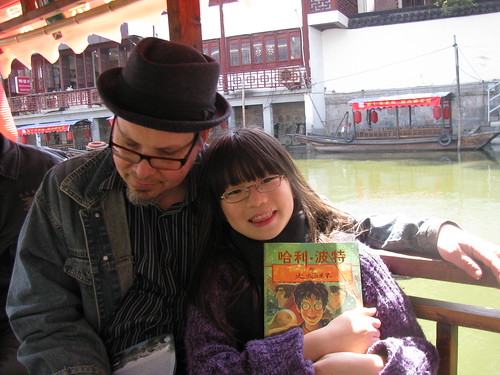|
|
Wednesday, July 23rd, 2003
In regards to the LanguageHat post on translating Wittgenstein -- I posted in his comments a translation of a line of Rilke that I think is pretty good, and maybe better than the previous translations that have been made of that line -- it was not hard, I used what seems like a pretty obvious device that seems, however, not to have occurred to J.B. Leishman, A.J. Poulin, Steven Cohn, or William Gass. And also I had some interesting ideas about the line of Wittgenstein that is quoted. So this is where I get things out of order and say, "Hey, maybe I've finally found my calling! -- I will translate German literature!" But wait... what I translated was a single line, or half a line, out of the rather large Duino Elegies -- a work which I have not yet been able to make my way through. Perhaps though, some future exists for me as a translator of epigrams. I have had some fun over the years translating German stories and other stuff, with varying degrees of success. I would like to reproduce here my best effort thus far, coincidentally also a poem by Rilke: Der Novembertag Kalter Herbst vermag den Tag zu knebeln,
seine tausend Jubelstimmen schweigen;
hoch vom Domturm wimmern gar so eigen
Sterbeglocken in Novembernebeln.
Auf den nassen Daechern liegt verschlafen
weisses Dunstlicht; und mit kalten Haenden
greift der Sturm in des Kamines Waenden
eines Totenkarmens Schlussoktaven. The November Day Cold autumn can muzzle the day,
silence its thousand jubilating voices;
from the high cathedral tower whimper, so peculiar,
from the steeple whimper, so peculiar,
death bells in November's mist.
On the wet rooftops lies sleeping
a white fog; and with cold hands
the storm inside the chimney's walls strikes
a death-karma's closing octaves. It loses meter and rhyme which are, yes, rather important in the original -- but I think it communicates Rilke's image and feeling quite well. And I'm happy about preserving much of the word order and separation by line of images. By the way: is anyone else reminded very strongly of the end of Prufrock? -- I refer to the catlike fog which curled around the roof and fell asleep, I think is how it goes. Update: I changed "high cathedral tower" to "steeple" in response to an accurate observation by LanguageHat that the former was too long. The rhythm is a lot better now. Also I took out a "the" in the following line and replaced it with an "'s". LH does not like the inversion in "lies sleeping/ a white fog", but I do, it's staying in there. Update 2:I realize a potential major problem with this translation is, I have no clear idea what "a death-karma's closing octaves" means. If you have any thoughts in this regard, please let me know.
posted evening of July 23rd, 2003: Respond
➳ More posts about Translation
|  |
Friday, April 30th, 2004
Lilith has suggested that everyone post a favorite poem today. Here is my contribution to the effort, an early poem by Rilke with my own translation. Der Novembertag
Kalter Herbst vermag den Tag zu knebeln,
seine tausend Jubelstimmen schweigen;
hoch vom Domturm wimmern gar so eigen
Sterbeglocken in Novembernebeln.
Auf den nassen Daechern liegt verschlafen
weisses Dunstlicht; und mit kalten Haenden
greift der Sturm in des Kamines Waenden
eines Totenkarmens Schlussoktaven.
The November Day
Cold autumn can muzzle the day,
silence its thousand jubilating voices;
from the steeple whimper, so peculiar,
death bells in November's mist.
On the wet rooftops lies sleeping
a white fog; and with cold hands
the storm inside the chimney's walls strikes
a death-karma's closing octaves.
posted morning of April 30th, 2004: Respond
➳ More posts about Readings
|  |
Monday, February 9th, 2009
Elizabeth Costello is a book which I am finding requires access to source material. (I am kind of ignoring the major piece of source material for this book, but trying to track down the incidental pieces...) Below the fold, some source material for chapter 4, "The Poets and the Animals." This interview with Coetzee from the Swedish magazine Djurens Rätt ("Animal Rights"), while not strictly speaking "source material," also seems useful.
↷read the rest...
posted evening of February 9th, 2009: 4 responses
➳ More posts about Elizabeth Costello
|  |
Sunday, November 27th, 2022
One of the first poems I ever translated was "Der Novembertag," by Rainer Maria Rilke. The closing line of the poem has the wind in the chimney sounding out "eines Totenkarmens Schlussoktaven." I mistranslated this as "a death-karma's closing octaves" which has always struck me as a beautiful and enigmatic image...
This morning it occurred to me to mention this in my recently-created Mastodon account; and Mastodon came through! A couple of people suggested the archaic German Totencarmen, meaning "funerary song," obviously the correct interpretation.
Der Novembertag
Kalter Herbst vermag den Tag zu knebeln,
seine tausend Jubelstimmen schweigen;
hoch vom Domturm wimmern gar so eigen
Sterbeglocken in Novembernebeln.
Auf den nassen Daechern liegt verschlafen
weisses Dunstlicht; und mit kalten Händen
greift der Sturm in des Kamines Wänden
eines Totenkarmens Schlußoktaven.
The November Day
Cold autumn can muzzle the day,
silence its thousand jubilating voices;
from the steeple whimper, so peculiar,
death bells in November's mist.
On the wet rooftops lies sleeping
a white fog; and with cold hands
the storm inside the chimney's walls strikes
a lamentation's closing octaves.
posted morning of November 27th, 2022: Respond
➳ More posts about Mistranslation
| |
|
Drop me a line! or, sign my Guestbook.
•
Check out Ellen's writing at Patch.com.
| |

